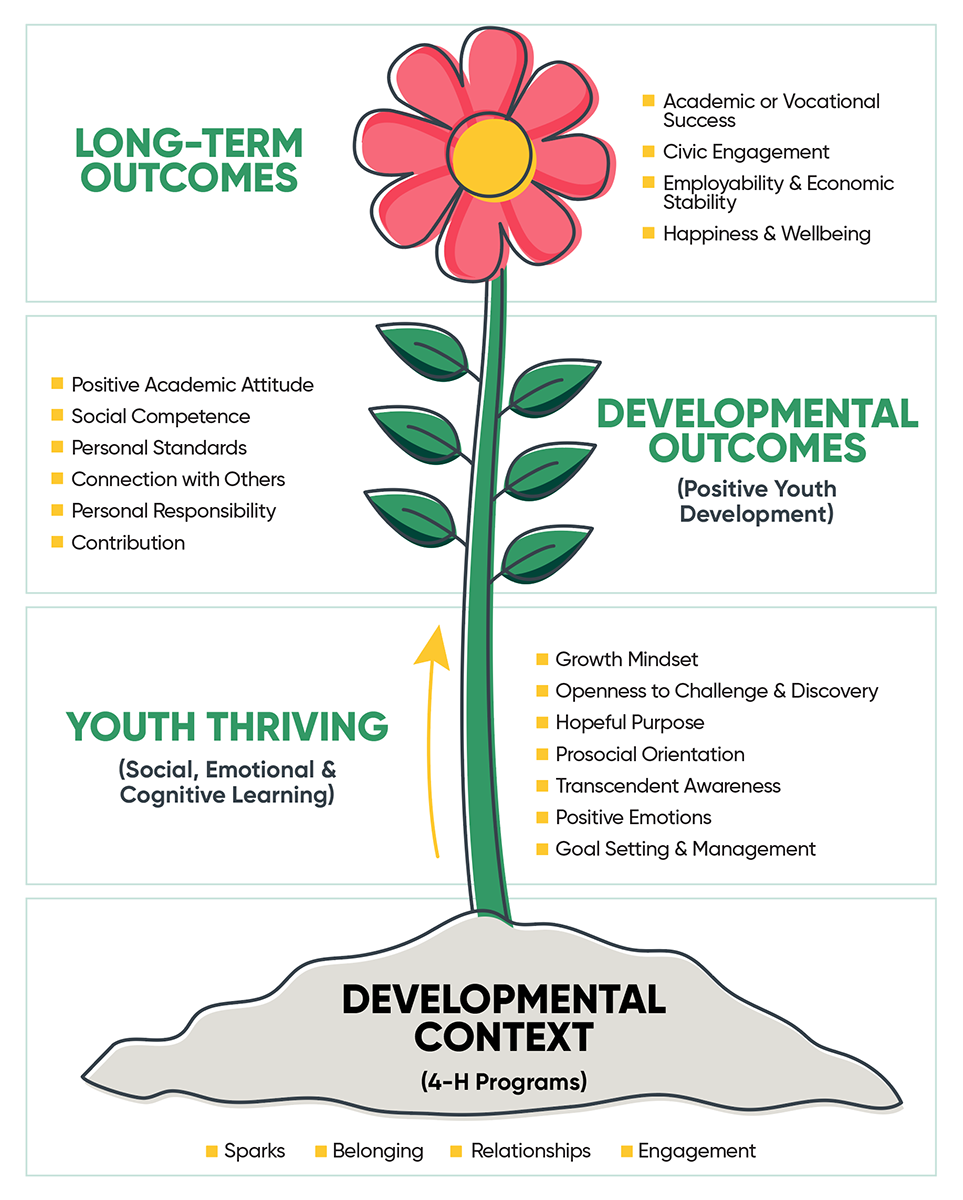
By Tracy Anderson, Extension Educator in Lancaster County
Research shows participating in positive youth development programs such as 4-H, leads to young people who care about others, provide leadership and are civically engaged. The 4-H Thriving Model provides a guide for how to ensure what happens in a program is actually positive youth development.
The 4-H Thriving Model is a “predictive model.” It predicts that when youth experience quality 4-H programs and are engaged, they will thrive. This means they are more likely to attain academic or vocational success, economic stability, be civically engaged and have happiness and well-being.
DEVELOPMENTAL CONTEXT
A flower graphic provides a visual for the model. Beginning with the developmental context or the “soil,” flowers need high-quality soil to grow. Youth also need a good base — we refer to this as the developmental context — which consists of opportunities for youth to: 1) find their spark such as engineering, food and nutrition, leadership or animal science, 2) feel a sense of belonging, 3) build relationships and 4) foster engagement.
YOUTH THRIVING
Youth Thriving is the next step and provides a bridge between program context and outcomes and intentionally promotes social, emotional and cognitive learning. Within this step, there are seven key indicators:
1. Growth mindset
2. Openness to challenge and discovery
3. Hopeful purpose
4. Pro-social orientation
5. Transcendent awareness
6. Positive emotions
7. Goal setting and management
DEVELOPMENTAL OUTCOMES
Youth who experience the developmental context and social, emotional skills and cognitive learning achieve key positive youth developmental outcomes, which is the next step. This includes:
1. Academic motivation and success
2. Social competence
3. Personal standards
4. Connection with others
5. Personal responsibility
6. Contribution
LONG-TERM OUTCOMES
Long-term outcomes — the final step — are more likely to be achieved when youth achieve developmental outcomes. These are marked by vocational or academic success, civic engagement, employability and economic stability, and happiness and well being.
References:
• Arnold, M. E., Gagnon, R. J. (2019) “Illuminating the Process of Youth Development: The Mediating Effect of Thriving on Youth Development Program Outcomes.” Journal of Human Sciences, 7(3), 24-30.
• Arnold, M. E. (2018). “From Context to Outcomes: A Thriving Model for 4-H Youth Development Programs.” Journal of Human Sciences and Extension, 6(1), 141–160.
****************************************
WHAT 4-H ALUMNI SAY
Adults who participated in Lancaster County 4-H as youth report how 4-H contributed to their thriving today as adults. (High school graduation dates are in parenthesis.)
“4-H was a big part of my childhood and formed me into the person I am today. 4-H gave me self-confidence. This self-confidence led me to be a leader throughout school, college and my career. Through 4-H, I developed relationships that last a lifetime. … These skills helped me get a job and to thrive as a math teacher, wife and mother.”
—Karen (Clinch) Lindstrom (2006)
“The skills I developed in 4-H … have contributed significantly to my experiences as a ‘natural leader.’ Some of it may be natural, but it was fostered in 4-H where I learned to lead a meeting, set an agenda, seek feedback and contribute as a team member. 4-H is an invaluable part of my upbringing.”
—Dr. Nicole (Pedersen) Bartek (2006) DNP, Psychiatric Nurse Practitioner, Houston
“My experiences in 4-H helped me develop many necessary life skills. The 4-H program taught me the importance of community involvement and service. My 4-H experiences also helped me develop effective communication skills. In May, I am graduating with a degree in Nursing from the University of South Dakota.”
—Anna Sump (2019)
“By participating in 4-H, I made some very special friendships, learned how to balance work, enhanced my personal life, strengthened my communication skills and learned how to give back to the community. I am excited to begin my first teaching job this fall.”
—Valerie Gabel (2019)